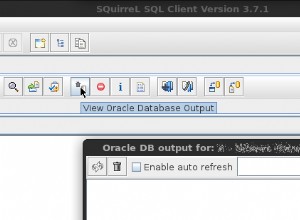Bueno, después de mucha investigación y revisión de documentación contradictoria, encontré la respuesta. Desafortunadamente, no era el que estaba buscando:
En pocas palabras, Slick no admite funciones o procedimientos almacenados listos para usar, por lo que tenemos que escribir los nuestros.
La respuesta es salir de Slick tomando el objeto de la sesión y luego usar JDBC estándar para administrar la llamada al procedimiento. Para aquellos de ustedes que están familiarizados con JDBC, eso no es un placer... pero, afortunadamente, con Scala podemos hacer algunos trucos muy buenos con la coincidencia de patrones que facilitan el trabajo.
El primer paso para mí fue armar una API externa limpia. Así es como quedó:
val db = Database.forDataSource(DB.getDataSource)
var response: Option[GPInviteResponse] = None
db.withSession {
implicit session => {
val parameters = GPProcedureParameterSet(
GPOut(Types.INTEGER) ::
GPIn(Option(i.token), Types.VARCHAR) ::
GPIn(recipientAccountId, Types.INTEGER) ::
GPIn(Option(contactType), Types.INTEGER) ::
GPIn(contactValue, Types.VARCHAR) ::
GPIn(None, Types.INTEGER) ::
GPIn(Option(requestType), Types.CHAR) ::
GPOut(Types.INTEGER) ::
Nil
)
val result = execute(session.conn, GPProcedure.SendInvitation, parameters)
val rc = result.head.asInstanceOf[Int]
Logger(s"FUNC return code: $rc")
response = rc match {
case 0 => Option(GPInviteResponse(true, None, None))
case _ => Option(GPInviteResponse(false, None, Option(GPError.errorForCode(rc))))
}
}
}
db.close()
Aquí hay un recorrido rápido:creé un contenedor simple para modelar una llamada a procedimiento almacenado. El GPProcedureParameterSet puede contener una lista de instancias de GPIn, GPOut o GPInOut. Cada uno de estos asigna un valor a un tipo JDBC. El contenedor se ve así:
case class GPOut(parameterType: Int) extends GPProcedureParameter
object GPOut
case class GPIn(value: Option[Any], parameterType: Int) extends GPProcedureParameter
object GPIn
case class GPInOut(value: Option[Any], parameterType: Int) extends GPProcedureParameter
object GPInOut
case class GPProcedureParameterSet(parameters: List[GPProcedureParameter])
object GPProcedureParameterSet
object GPProcedure extends Enumeration {
type GPProcedure = Value
val SendInvitation = Value("{?=call app_glimpulse_invitation_pkg.n_send_invitation(?, ?, ?, ?, ?, ?, ?)}")
}
Para completar, incluyo la enumeración GPProcedure para que pueda ponerlo todo junto.
Todo esto se entrega a mi execute() función. Es grande y desagradable, huele a JDBC anticuado, y estoy seguro de que mejoraré bastante el Scala. Literalmente terminé esto a las 3 am anoche... pero funciona, y funciona muy bien. Tenga en cuenta que este particular execute() la función devuelve una List que contiene todos los parámetros OUT... Tendré que escribir un executeQuery() separado función para manejar un procedimiento que devuelve un resultSet . (Sin embargo, la diferencia es trivial:solo escribe un ciclo que toma un resultSet.next y mételo todo en una List o cualquier otra estructura que desee).
Aquí está el gran y desagradable mapeo de Scala<->JDBC execute() función:
def execute(connection: Connection, procedure: GPProcedure, ps: GPProcedureParameterSet) = {
val cs = connection.prepareCall(procedure.toString)
var index = 0
for (parameter <- ps.parameters) {
index = index + 1
parameter match {
// Handle any IN (or INOUT) types: If the optional value is None, set it to NULL, otherwise, map it according to
// the actual object value and type encoding:
case p: GPOut => cs.registerOutParameter(index, p.parameterType)
case GPIn(None, t) => cs.setNull(index, t)
case GPIn(v: Some[_], Types.NUMERIC | Types.DECIMAL) => cs.setBigDecimal(index, v.get.asInstanceOf[java.math.BigDecimal])
case GPIn(v: Some[_], Types.BIGINT) => cs.setLong(index, v.get.asInstanceOf[Long])
case GPIn(v: Some[_], Types.INTEGER) => cs.setInt(index, v.get.asInstanceOf[Int])
case GPIn(v: Some[_], Types.VARCHAR | Types.LONGVARCHAR) => cs.setString(index, v.get.asInstanceOf[String])
case GPIn(v: Some[_], Types.CHAR) => cs.setString(index, v.get.asInstanceOf[String].head.toString)
case GPInOut(None, t) => cs.setNull(index, t)
// Now handle all of the OUT (or INOUT) parameters, these we just need to set the return value type:
case GPInOut(v: Some[_], Types.NUMERIC) => {
cs.setBigDecimal(index, v.get.asInstanceOf[java.math.BigDecimal]); cs.registerOutParameter(index, Types.NUMERIC)
}
case GPInOut(v: Some[_], Types.DECIMAL) => {
cs.setBigDecimal(index, v.get.asInstanceOf[java.math.BigDecimal]); cs.registerOutParameter(index, Types.DECIMAL)
}
case GPInOut(v: Some[_], Types.BIGINT) => {
cs.setLong(index, v.get.asInstanceOf[Long]); cs.registerOutParameter(index, Types.BIGINT)
}
case GPInOut(v: Some[_], Types.INTEGER) => {
cs.setInt(index, v.get.asInstanceOf[Int]); cs.registerOutParameter(index, Types.INTEGER)
}
case GPInOut(v: Some[_], Types.VARCHAR) => {
cs.setString(index, v.get.asInstanceOf[String]); cs.registerOutParameter(index, Types.VARCHAR)
}
case GPInOut(v: Some[_], Types.LONGVARCHAR) => {
cs.setString(index, v.get.asInstanceOf[String]); cs.registerOutParameter(index, Types.LONGVARCHAR)
}
case GPInOut(v: Some[_], Types.CHAR) => {
cs.setString(index, v.get.asInstanceOf[String].head.toString); cs.registerOutParameter(index, Types.CHAR)
}
case _ => { Logger(s"Failed to match GPProcedureParameter in executeFunction (IN): index $index (${parameter.toString})") }
}
}
cs.execute()
// Now, step through each of the parameters, and get the corresponding result from the execute statement. If there is
// no result for the specified column (index), we'll basically end up getting a "nothing" back, which we strip out.
index = 0
val results: List[Any] = for (parameter <- ps.parameters) yield {
index = index + 1
parameter match {
case GPOut(Types.NUMERIC) | GPOut(Types.DECIMAL) => cs.getBigDecimal(index)
case GPOut(Types.BIGINT) => cs.getLong(index)
case GPOut(Types.INTEGER) => cs.getInt(index)
case GPOut(Types.VARCHAR | Types.LONGVARCHAR | Types.CHAR) => cs.getString(index)
case GPInOut(v: Some[_], Types.NUMERIC | Types.DECIMAL) => cs.getInt(index)
case GPInOut(v: Some[_], Types.BIGINT) => cs.getLong(index)
case GPInOut(v: Some[_], Types.INTEGER) => cs.getInt(index)
case GPInOut(v: Some[_], Types.VARCHAR | Types.LONGVARCHAR | Types.CHAR) => cs.getString(index)
case _ => {
Logger(s"Failed to match GPProcedureParameter in executeFunction (OUT): index $index (${parameter.toString})")
}
}
}
cs.close()
// Return the function return parameters (there should always be one, the caller will get a List with as many return
// parameters as we receive):
results.filter(_ != (()))
}




